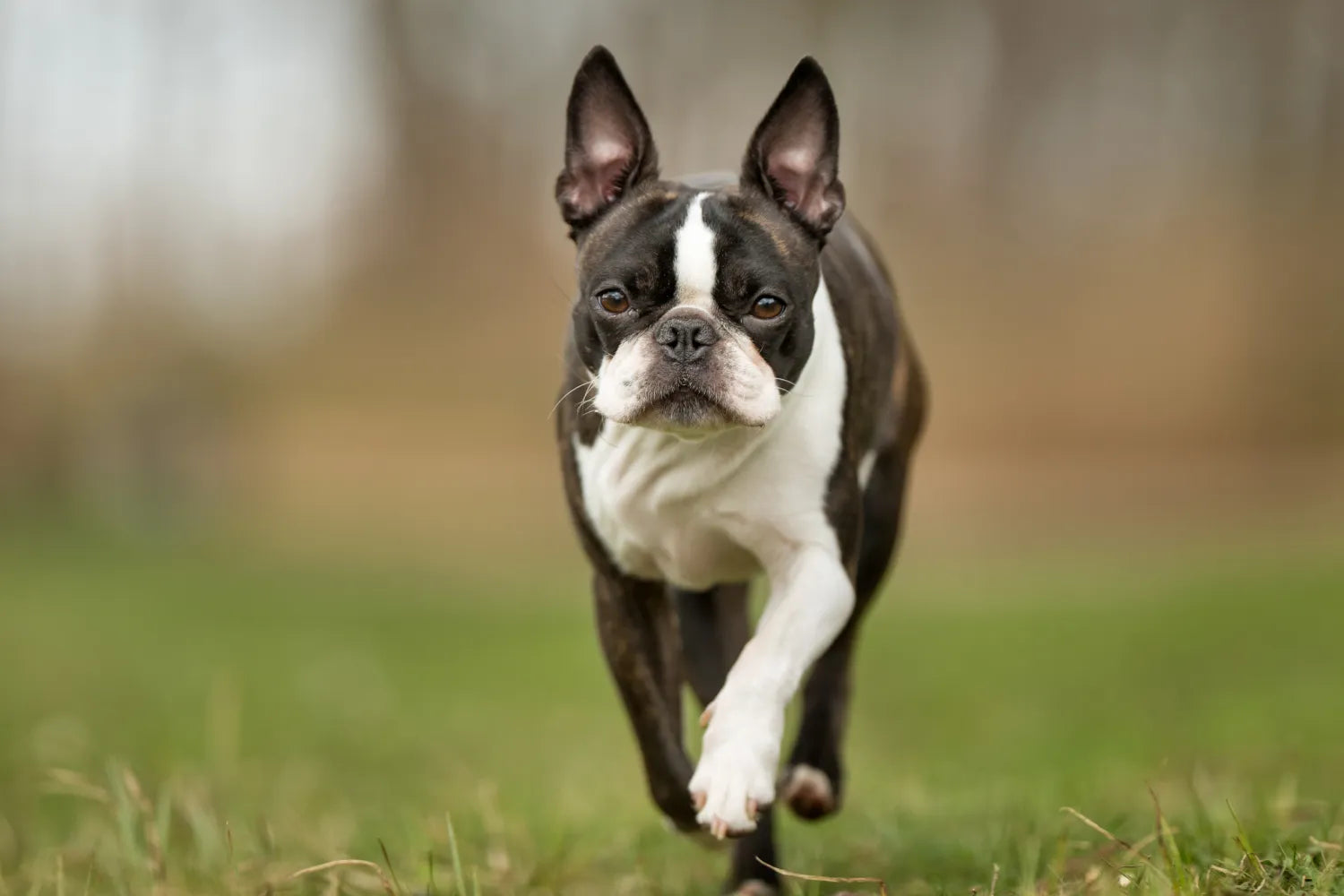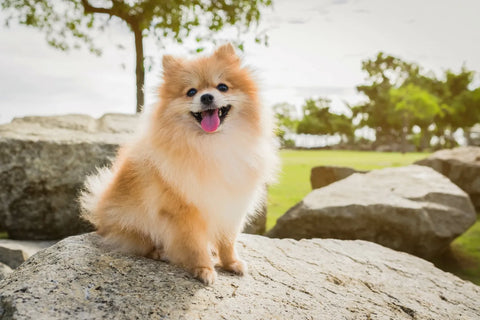
Caring for Your Boston Terrier: A Simple Guide
At A Pup Above, we celebrate the unique joy and companionship that Boston Terriers bring into our lives. These little dynamos are not just pets but partners in crime, best friends, and sometimes, the life of the party. But with great power comes great responsibility, right?
That's why we've put together this guide on how to care for your Boston Terrier. We promise it's going to be full of tips and tricks to help you and your pup thrive together.
So, let's dive in and discover the secrets to a happy Boston Terrier life!
What Makes the Boston Terrier a Unique Breed?
Boston Terriers are not your average small dog. They pack a lot of personality and some distinctive traits that set them apart from other dog breeds.
Here's what makes them stand out:
- Historic Roots: Originating in 19th-century America, specifically Massachusetts, the Boston Terrier was bred from a mix of the English Bulldog and the now-extinct White English Terrier, creating a truly American breed.
- Tuxedo Markings: Known for their elegant coat patterns, they often come in brindle, black, or seal with white markings that resemble a tuxedo — earning them the nickname "the American Gentleman."
- Compact and Muscular Frame: Despite their small size, Boston Terriers have a sturdy, muscular build, reflecting their bulldog ancestry.
- Friendly and Sociable Nature: These dogs are renowned for their friendly demeanor, making them excellent companions and family dogs.
- Distinctive Facial Features: With their large round eyes and short muzzle, Boston Terriers have a unique and expressive face that's hard to resist.
- Intelligent and Eager To Please: They are smart and trainable, responding well to positive reinforcement and making great pets for those willing to invest in training.
- Adaptable to Various Living Situations: Whether you live in a spacious house or a compact apartment, the Boston Terrier adapts well to different living environments, as long as they're with their beloved humans.
How Long Do Boston Terriers Live?
When it comes to the lifespan of a Boston Terrier, these little companions tend to stick around for quite some time, typically living 11 to 15 years. Of course, like any breed, their longevity hinges on several factors, including genetics, lifestyle, and, most importantly, the care they receive throughout their lives.
Here's how you can help ensure your Boston Terrier lives a long, healthy life:
Nutrition
Feeding them a balanced diet of high-quality, human-grade food, like our Turkey Pawella or Chicka Chicka Bow Wow, can significantly impact their health and vitality.
Regular Exercise
Keeping them active with daily walks and play sessions helps maintain their muscle tone and keeps those extra pounds off, which is crucial for a breed prone to obesity.
Preventive Health Care
Regular check-ups with your vet, along with timely vaccinations and health screenings, can prevent or manage health issues common in the breed, such as patellar luxation and cataracts.
Mental Stimulation
Boston Terriers are intelligent and can get bored easily, so engaging them with toys, puzzles, and training keeps their mind sharp and spirits high.
Love and Attention
Above all, these dogs thrive on human companionship. Spending quality time with your Boston Terrier, showering them with love and attention, contributes to their overall well-being and happiness.
Boston Terrier Feeding Chart
Now that you know the importance of balanced, high-quality nutrition for your Boston Terrier, you might be wondering, "How much should I feed my buddy, and does it change as they grow? What about treats?" Don't worry, we've got you covered!
Here’s a breakdown that makes mealtime easy and fun:
Feeding Guide by Life Stage:
- Boston Terrier Puppies (up to 1 year old): These active pups need plenty of fuel for their adventures. Offer them specially formulated puppy food that’s packed with essential nutrients and quality protein to support their growth and high energy levels.
Puppies Need: Typically, about ½ to 1 cup of puppy food per day, split into three meals.
Treat Tip: Tiny bits of vegetables (check out our guide on What Vegetables are Good for Dogs?) are perfect for training and healthy snacking.
- Adult Boston Terriers (1-7 years): As they mature, their activity level might vary. Stick to premium adult dog food, be it dry food, fresh food, or kibble, tailored to meet the nutritional needs of small breeds.
Adult Dogs Need: Adjust the right amount of food — usually around 1 to 1½ cups of food per day, based on their size and energy output.
Healthy Treats: For additional treat ideas, explore our article What Fruits are Good for Dogs? which offers delicious and nutritious options.
- Senior Boston Terriers (over 7 years old): Aging dogs benefit from food that supports weight management and eases digestion. Consider switching to a high-quality wet food or a gentle raw diet that caters to their digestive system and food sensitivities.
Older Dogs Need: Adjust to smaller, more digestible meals as recommended by your vet.
Supplemental Snacks: Add a sprinkle of fatty acids (fish oil) or a calcium supplement to their meals to help maintain their shiny coat and support overall health.
What Are Common Health Issues in Boston Terriers?
While Boston Terriers are generally healthy and spirited, they do have a predisposition to certain health issues that owners should be aware of.
Recognizing and understanding these concerns can help you provide the best care for your dog:
Brachycephalic Syndrome
Due to their short muzzle, Boston Terriers fall under the category of brachycephalic dogs. This anatomical structure can lead to breathing difficulties, especially in hot weather or during strenuous exercise. Keeping them cool and avoiding overexertion is key.
Patellar Luxation
This condition, where the kneecap slips out of place, is relatively common in Boston Terriers. Signs include occasional limping or a strange gait. Regular veterinary check-ups can help catch this early.
Cataracts and Glaucoma
Eye health is a concern for Boston Terriers. Cataracts can develop at a young age, and glaucoma, a condition that increases pressure within the eye, can also affect them. Regular eye exams are recommended.
Deafness
This breed can be predisposed to deafness, particularly in dogs with predominantly white coats. A hearing test conducted by your vet can diagnose this early on.
Allergies and Skin Conditions
Their fine coat and sensitive skin can make them prone to allergies and skin issues. A diet rich in omega-3 fatty acids, like those found in our human-grade meals, can support skin health.
Heart Problems
Including congenital heart defects, which can affect this breed. Regular veterinary visits for heart health checks are crucial to early detection and management.
Grooming Needs of the Boston Terrier
Boston Terriers are low maintenance when it comes to grooming, thanks to their short coat. However, they do require regular care to keep them looking their best and to prevent health issues:
- Routine Bathing and Grooming: Their short coat makes bathing a relatively easy task. A monthly bath, along with a gentle dog-specific shampoo, can keep their coat healthy and shiny.
- Use of a Grooming Mitt: A grooming mitt is ideal for Boston Terriers. It helps remove loose hair and stimulates the skin, reducing the amount of dead hair and minimizing shedding.
- Facial Care: Due to their distinctive facial features, regular cleaning of the folds around their face is important to prevent dirt buildup and infection.
- Nail Trimming: Regular nail trims are essential to prevent discomfort and potential health problems. This is also a good time to check their paws for any issues.
- Ear Cleaning: Their ears should be checked and cleaned regularly with a vet-approved solution to prevent infections.
- Dental Care: Regular dental care, including teeth brushing and dental treats, can prevent dental diseases, which are common in small dogs.
Quick Tips for Boston Terrier Care
When it comes to enriching the life of your Boston Terrier, every detail counts. Beyond the basics of nutrition, exercise, and grooming, here are some tailored tips to ensure your Boston Terrier thrives:
- Embrace Their Energetic Spirit: Foster their high-energy levels with varied activities. Boston Terriers enjoy everything from brisk walks to games of fetch. These activities meet their exercise needs and strengthen your bond with them.
- Recognize Their Role: As natural watchdogs, they are alert and keenly observant. While they're not prone to excessive barking, they'll let you know when something's amiss. Appreciate their vigilance and provide reassurance when they alert you.
- Selecting a Boston Terrier: When looking for Boston Terrier puppies, choose reputable breeders who can provide health clearances for the parents. This ensures you're bringing a healthy companion dog into your home.
- Weather Considerations: Their short coat offers minimal protection against extreme temperatures. During cold weather, ensure they have warm clothing, and in hot weather, keep them cool to prevent overheating.
- Meeting Their Social Needs: Boston Terriers are companion dogs at heart. They thrive on interaction with their human family and other pets. Regular socialization helps keep them happy and well-adjusted.
Conclusion
At A Pup Above, we understand that your Boston Terrier is more than just a pet — they're a cherished member of your family. By following the guidance in this guide, you can ensure your Boston Terrier enjoys a fulfilling and joyful life.
Remember, the key to a happy Boston Terrier life lies in balanced nutrition, regular exercise, and plenty of love and attention. With these ingredients, you'll not only meet their physical and emotional needs but also deepen the unbreakable bond between you and your pup.
Here's to many wonderful years together with your spirited, affectionate, and utterly irreplaceable Boston Terrier.
Sources:
Boston Terrier Dog Breed Information | The American Kennel Club (AKC)
Boston Terrier | Description, Temperament, & Facts | Britannica
Boston Bull Terrier Facts: 7 Things to Know About This Non-Sporting Breed | The AKC
Boston Terrier Life Span Average Expectancy | Boston Terrier
Top Stories

Why Do Dogs Lick Their Paws?

Why Do Dogs Whimper & Make Noises in Their Sleep?

Healthy Vet-Approved Homemade Dog Food Recipes

How To Cook Sweet Potatoes for Dogs






















